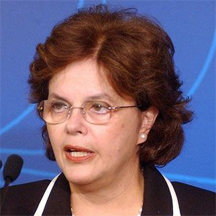BRASILIA, (Reuters) – President Dilma Rousseff struggled on Thursday to move on from one of the most embarrassing political defeats of her year-old government, a case that illustrates how gridlock in Brazil’s capital is dragging down the economy.

The Senate voted late on Wednesday to reject Rousseff’s preferred candidate to head the ANTT national land transport agency, which is responsible for a host of critical road and rail infrastructure projects as Brazil prepares to host the 2014 World Cup and 2016 Olympics.
The vote was by secret ballot, but the loss in a chamber where Rousseff enjoys a sizeable majority – at least on paper – clearly indicated a rebellion by members of her 17-party coalition, many of whom are upset about government-imposed cuts to their discretionary funds.
Bernardo Figueiredo, the candidate who was rejected for the ANTT post, was especially close to Rousseff.
Rousseff met on Thursday with Vice President Michel Temer, who is also a senior leader of the biggest party in her coalition, the PMDB. She expressed her regret to Temer for the outcome of the vote, a government official said, speaking on condition of anonymity to describe the conversation.
Rousseff has found it difficult to pass major legislation since taking office in January 2011. Many business leaders say the lack of economic reforms is partly responsible for the high costs and taxes suffocating Brazil’s economy, which barely avoided a recession during the second half of last year and closed 2011 with growth of just 2.7 percent.
A career government technocrat who never held elected office prior to becoming president, Rousseff is very popular with the Brazilian public for her tough stance on corruption and solid, if unspectacular, economic management. Yet she has struggled with the back-slapping and pork-barrel politics that traditionally made business function in Brasilia.
She has been further restrained by the need to limit government spending to control inflation, which ended 2011 at a seven-year high.
Rousseff and Temer agreed during the meeting that she would include other members of her coalition in more critical decisions, the source said.
However, Rousseff made similar promises after difficult episodes last year, and tensions do not seem to have eased.
A spokesperson for the ANTT said that business at the agency could soon grind to a halt unless a new director is named. One example: an auction for companies to serve 1,967 interstate bus lines is set for April, but could be delayed without new appointments to the agency’s board.
Brazil’s inability to sort out its severe transportation bottlenecks is cited by businesses as a major factor holding back the economy. Delayed public transport projects have also contributed to a public spat with world soccer body FIFA.
FIFA’s general secretary Jerome Valcke said on Friday that Brazil needed a “kick up the backside” to be ready in time to host the World Cup. Valcke later apologized after Rousseff’s sports minister said he was no longer welcome as FIFA’s representative in Brazil.




